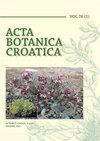干燥对蓝金银花浆果(Lonicera caerulea var. edulis Turcz)生物活性物质的影响。牧民交货)
IF 0.7
4区 生物学
Q3 PLANT SCIENCES
引用次数: 5
摘要
干果是延长水果(尤其是浆果)保质期的最简单方法之一。高温和加热时间都会显著改变金银花果实中一些初级和次级代谢产物的含量。采用高效液相色谱-质谱联用技术测定了不同热处理对其含量的影响。随着干燥时间的延长,糖含量变化不大,而有机酸含量下降。抗坏血酸完全降解,无论时间或加热温度如何。不同的酚类基团对热强度和干燥时间的反应不同。与加热持续时间相比,黄烷醇对更高的温度更敏感,在75°C时它们减少了70%以上。相反,无论时间和温度如何,羟基肉桂酸的含量都随着干燥而增加75%以上。本文章由计算机程序翻译,如有差异,请以英文原文为准。
The impact of drying on bioactive compounds of blue honeysuckle berries (Lonicera caerulea var. edulis Turcz. ex Herder)
Drying fruit is one of the simplest ways to extend the shelf-life of fruit, especially berries. Both higher temperature and time of heating significantly change the contents of some primary and secondary metabolites in honeysuckle fruit. Differences in their contents arising from different heat treatments were determined with the aid of high-performance liquid chromatography (HPLC) coupled with mass spectrophotometry (MS). The content of sugars showed a small change with drying, while organic acid contents decreased with a longer drying time. Ascorbic acid was totally degraded, regardless of the time or heating temperature. Different phenolic groups responded differently to heat intensity and time of drying. Flavanols were more sensitive to higher temperature than to duration of heating and they decreased by more than 70% at 75 °C. In contrast, the content of hydroxycinnamic acids, increased with drying by more than 75%, regardless of the time and temperature.
求助全文
通过发布文献求助,成功后即可免费获取论文全文。
去求助
来源期刊

Acta Botanica Croatica
PLANT SCIENCES-
CiteScore
2.50
自引率
0.00%
发文量
34
审稿时长
>12 weeks
期刊介绍:
The interest of the journal is field (terrestrial and aquatic) and experimental botany (including microorganisms, plant viruses, bacteria, unicellular algae), from subcellular level to ecosystems. The attention of the Journal is aimed to the research of karstic areas of the southern Europe, karstic waters and the Adriatic Sea (Mediterranean).
 求助内容:
求助内容: 应助结果提醒方式:
应助结果提醒方式:


